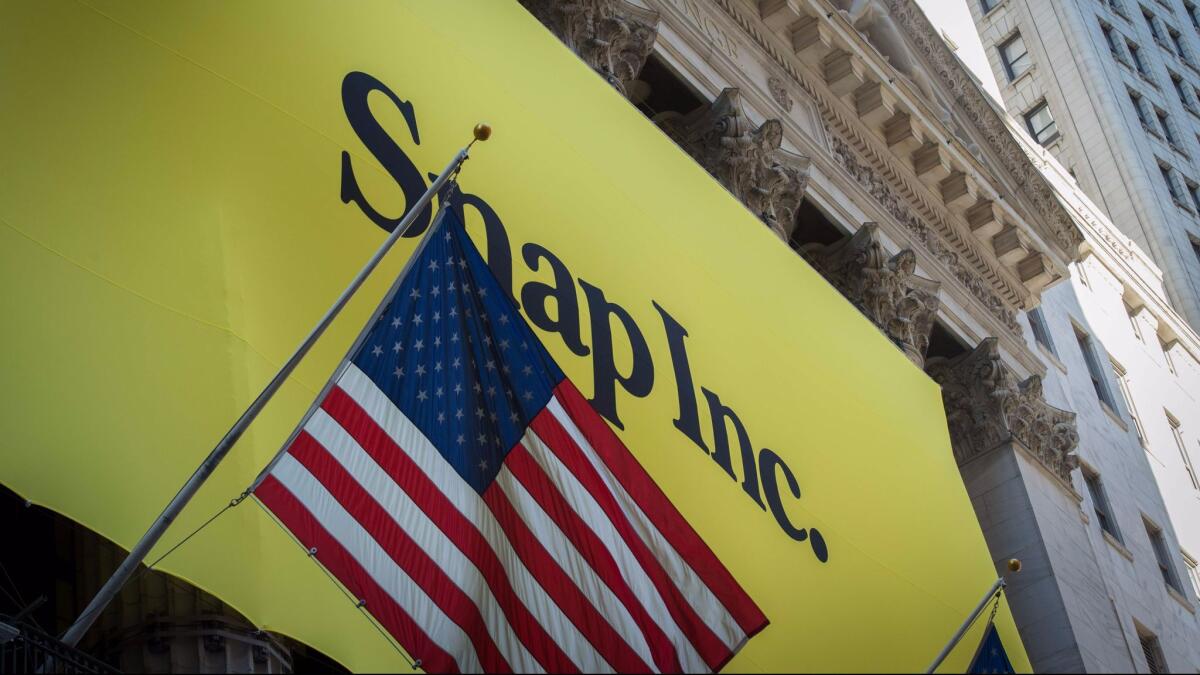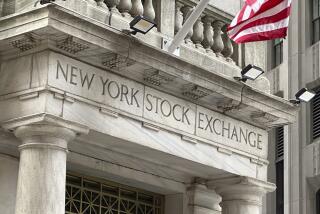Will tech companies bow to S&P’s new Snap-inspired rules? Probably not

- Share via
When the company that produces the S&P 500 announced this month that it would exclude the corporate parent of Snapchat from its benchmark stock market index, the move was cheered by advocates of better corporate governance.
It was seen as an overdue response to a disturbing trend, particularly in tech: Founders, when they take a company public, do whatever they can to maintain control of their firms, even when they own relatively small stakes.
In the case of Venice-based Snap Inc., it had issued only nonvoting shares in its March IPO — as far as it gets from many investors’ ideal of all shares having equal voting power.
But it’s far from clear that the stand taken by S&P Dow Jones Indices will have much effect, even though inclusion in the index boosts a stock price by 5% on average.
“There is a lot of evidence that company management won’t care,” said Chris Jones, the former chief investment officer for asset management giant BlackRock’s domestic equity business.
Jones, now a member of the investment committee at Irvine investing start-up Acorns, said the new rules might convince some small companies to change the way they plan to go public. But not so for big, well-known firms that investors are clamoring to invest in.
“When Uber comes public, they’ll come with some kind of differentiated structure,” he said.
The S&P rules say that companies with more than one class of stock will not be eligible to join its benchmark S&P 500, MidCap 400 and SmallCap 600 indexes, which track large, mid-size and small companies, respectively. Companies already included in the indexes, however, will be able to stay put.
The announcement followed a similar rule change by FTSE/Russell, which plans to exclude companies from its indexes, including the Russell 3000, if they severely limit the voting rights held by ordinary shareholders.
Over the last decade and a half, numerous companies including Google, Facebook, Workday and LinkedIn have gone public with two classes of stock. One, owned by founders and early investors, carries outsized voting rights — often 10 votes per share. The other, sold to everyone else, has just one vote per share.
When Snap went public in March, it took things one step further, selling shares to the public that came with no voting rights at all. That prompted S&P, FTSE/Russell and another index manager, MSCI, to ask investors whether Snap’s nonvoting shares or shares of other companies with little or no voting power should be included in their indexes.
Most investors, according to the results of polling released by FTSE/Russell, said the indexes should include only companies that give ordinary shareholders meaningful voting rights.
When companies are included in major indexes, investment funds that seek to match the returns of a particular index are forced to buy shares — something some investors don’t like.
Aeisha Mastagni, an investment officer at the California State Teachers’ Retirement System, told The Times this spring that investing in Snap would encourage “bad behavior” but that the massive pension fund would nevertheless have to buy Snap shares if they were included in the Russell 3000.
Forced-buying by index-tracking funds is one of the big benefits of index inclusion, especially as index funds have become more popular than ever. Vanguard, a pioneer in index fund investing, has seen hundreds of billions of dollars flow into its index-tracking funds over the last few years alone.
Still, there’s much more cash in actively managed funds, meaning that there’s plenty of capital that can be invested in companies shut out of major indexes — and that the benefits of being included in the indexes may not be enough to persuade company founders to give up more control.
“I’d say 95% of companies won’t care,” said one Los Angeles attorney who spoke on the condition of anonymity because he has clients mulling over public offerings. “When someone is looking to go out with a dual-class structure, this is something they might think about, but I don’t think it will be persuasive.”
Indeed, in the long run fast-growing tech firms may hold the upper hand.
If companies don’t heed the new rules and continue to go public in ways that will keep them out of the big indexes, it could eventually make the indexes less attractive to investors.
For decades, the S&P 500 has been used as a gauge of what the U.S. stock market is doing. And index funds that track the S&P 500 are billed as a way to essentially invest in the whole market, or at least in the largest public companies.
But imagine if S&P had issued its new rule years ago and that companies such as Facebook and Google parent Alphabet never became part of the S&P 500.
According to an April report from investment firm State Street Global Advisors, if those and other companies with dual-class share structures were excluded from the S&P 500, the index’s returns would have fallen from 86.5% to 84.6% over the last decade. That’s because firms such as Facebook and Alphabet have seen outsized growth, boosting the index’s overall return.
That might help explain the position of Vanguard on the whole matter.
“We’re absolutely in favor of one share, one vote. We’re also proponents of index methodology that captures the broadest set of companies,” said Joe Brennan, head of the company’s equity investment group.
Jones, the former BlackRock investment manager, said this is an issue he’s thought about since S&P made its announcement.
“Are we going to have lower expected returns in our [funds] than we would ideally like to have because we’re excluding certain portions of the stock market?” he said.
For now, he doesn’t believe this is a big problem.
Even without the new rule, Snap would not be eligible to be included in the S&P 500. It’s plenty big enough, valued at about $15 billion, more than twice the valuation of the smallest company in the index, but it hasn’t been public for a full year and it isn’t close to being profitable — both requirements for membership.
Still, Jones said if Snap and other companies that will be excluded continue to grow and prosper, it could spur investors to rethink their position.
If investors feel S&P’s indexes are out of step with the market as a whole, another firm could create its own set of stock lists. Or S&P and other index managers could simply do an about-face.
“S&P and Russell might change their rules if the market told them investors don’t care about this stuff,” Jones said. “They are for-profit organizations. I think the market will respond to this somehow.”
Amy Borrus, deputy director of the Council of Institutional Investors, applauded the new S&P rule and said she believes it will at least prevent more companies from following Snap and going public with nonvoting shares.
But she said it’s true that some companies will continue to go public with multiple share classes and limited shareholder voting rights. For that to stop, she said, it will take more than new rules from index managers.
“These new rules don’t solve the problem,” she said. “This should be laid at the door of the stock exchanges. They should have standards that give shareholders some modicum of accountability.”
Times staff writer Paresh Dave contributed to this report.
Follow me: @jrkoren
ALSO
Snap executives sell $9 million worth of stock at first opportunity
Stock indexes slip again, but Herbalife jumps
Nostalgia TV makes a comeback. How Hulu and Netflix are breathing new life into old TV shows
Watch out for shady companies promising to help you repay student loans
More to Read
Inside the business of entertainment
The Wide Shot brings you news, analysis and insights on everything from streaming wars to production — and what it all means for the future.
You may occasionally receive promotional content from the Los Angeles Times.











